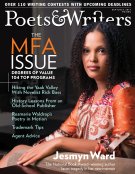We signed a six-month lease. That was my deadline. I had the seed of a story about a babysitter (a subject I’d been obsessed with since I turned in my first workshop story, years before). During the day I wrote at a desk that overlooked the Sandia Mountains, named for their watermelon-colored glow, and at night I waited tables at a diner. Customers who picked up on my midwestern accent asked what I was doing in New Mexico. When I told them I was writing a novel they smiled at me like I was a five-year-old who said she wanted to be an astronaut when she grew up.
I went on Meetup.com and found a writing group that met once a week at a woman’s apartment downtown. I paid a dollar and took the 66 bus down Central, past Nob Hill and the University of New Mexico, to the former Albuquerque High School, now converted into condos, where Ellen (MFA, University of Minnesota) lived above the gymnasium in a loft filled, floor-to-ceiling, with books.
The other members weren’t very consistent with their attendance, so it became just Ellen and me. She told me to hand in twenty-five pages of my novel every week, and I did. Ever ambitious, I was trying to write my novel from three different points of view, and she told me to stick to one. I took this advice, but then tried sending my main character off to Romania, a place I’d never been, to tell the story from the future. Ellen told me to knock it off. (Looking up Romanian phrases on the Internet was really just an inventive procrastination device, anyway.)
I didn’t finish my novel in Albuquerque, but I did write thirty-five thousand words in six months. Ellen and I stayed in touch, as I moved from place to place, and she was the one person who really nurtured my novel from start to finish.
Ironically, when my novel was published in 2012, it came with an invisible, honorary masters degree: Everyone assumed the novel was my thesis. After spending a lifetime avoiding the traditional education, I found myself in public, being asked the same questions over and over: Where had I done my MFA? What had I studied at Northwestern? (I never went to Northwestern, but the main character of my novel did.)
My frustrations over being chronically misunderstood finally resulted in my doing something abominable: I responded to a review of my own book. It wasn’t even a bad review. It was mixed-to-positive, and appeared on the Millions, a literary blog I read on a regular basis. The Millions allows comments. I typed one.
“Wait,” my editor wrote in an e-mail after I told him my plan. “That’s usually a bad idea. What do you want to say? What will you gain?”
I thought the reviewer missed a crucial point about the stage of life my character was at, and I said so. “It’s the Internet,” I thought—the place where I’d always been able to speak my mind. A few people immediately jumped in to say I was painting a “weird picture” of myself by replying, a few others got my back, and the reviewer herself responded generously and completely professionally.
But my favorite comment of all was this one: “MFAs who write first ‘novels’ responding to their work is sad and a sign of the times.… So much for criticism. Leigh Stein you should be ashamed of yourself.”
So much vitriol packed into a few lines! Such economy! There was the assumption I had an MFA, the assumption that my “novel” was just a faithful record of my life as a Northwestern grad, and the tsk-tsking at the end for responding to a review of my work, as if I were ruining literary criticism for everyone else. The author of this reply must have done his homework overnight, because the next morning the comment was deleted from the site (I saved it because I’m weird).
I may not have an MFA (and I do not have plans to get one), but I have to admit that I’ve directly benefited from the proliferation of creative writing programs, because so many people who’ve nurtured my work have advanced degrees in writing. But they couldn’t teach me the one skill their programs couldn’t teach them: how to weather the highs and lows of actually publishing a book. In the end, that’s something we all have to learn for ourselves.
Leigh Stein is the author of the novel The Fallback Plan and a collection of poems, Dispatch From the Future, both published by Melville House in 2012. Her memoir, Land of Enchantment, is forthcoming in August from Plume. She codirects the literary nonprofit organization Out of the Binders and lives outside New York City.








